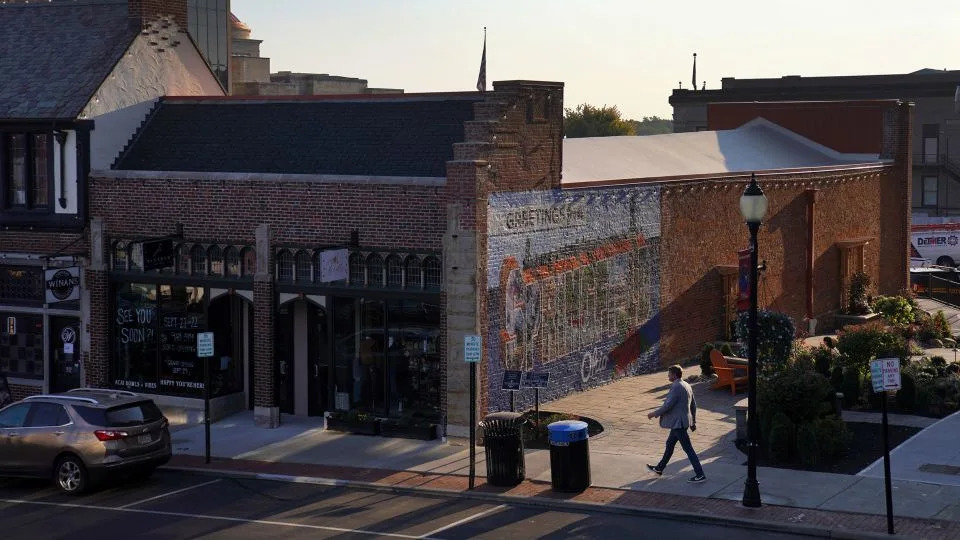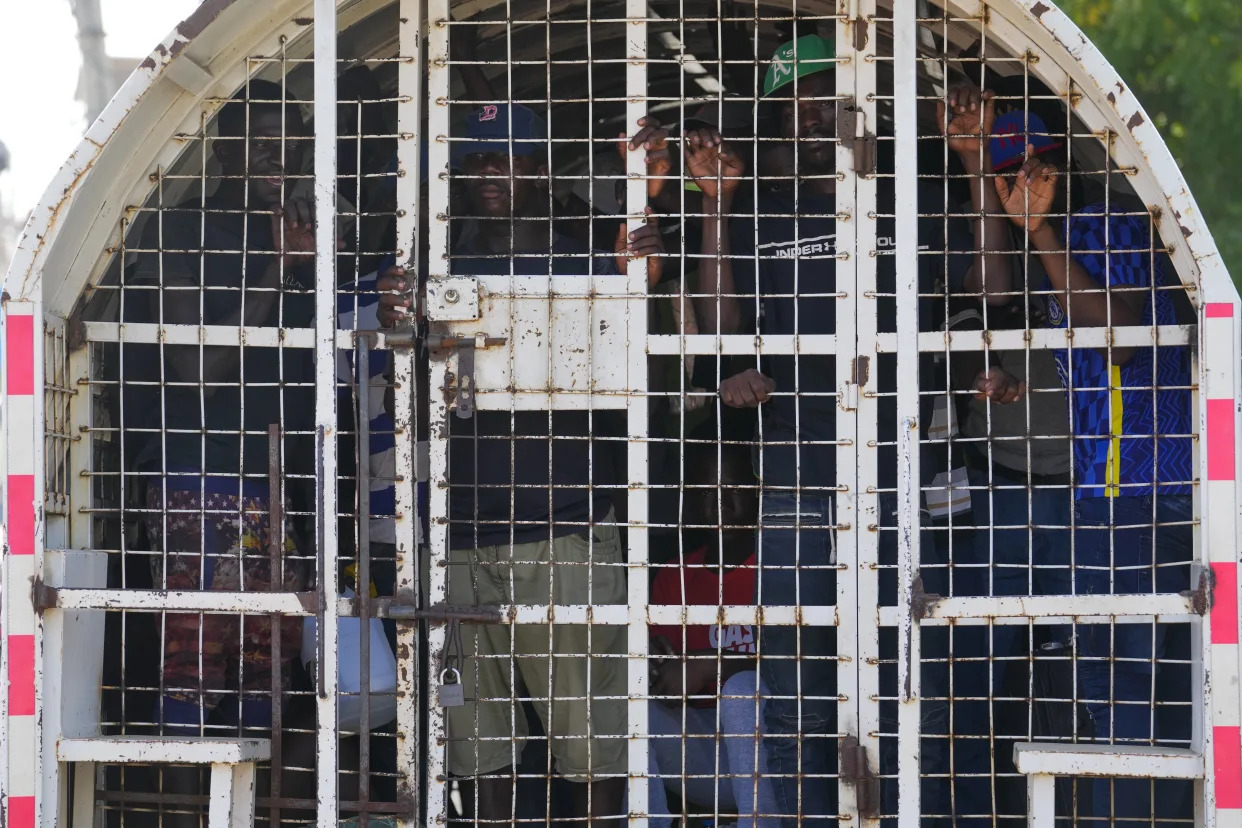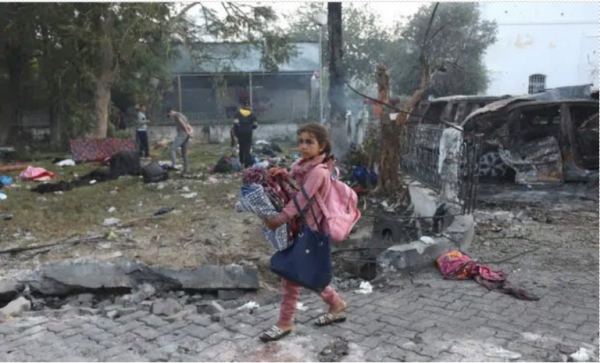Régine Théodat
Wed, October 2, 2024
As Haitians find themselves at the center of yet another political firestorm, a pawn in another U.S. election cycle, it’s easy for some in the United States to forget about the real people caught in the middle. The political back-and-forth might lead those unfamiliar with Haiti's struggle to wrongly assume that Haitians are incapable of being at the center of their self-determination, as if today’s Haitians are somehow different from those who rose up in 1791, fought their enslavers and liberated themselves in 1804 to create the first free Black republic.
A new documentary, "The Fight for Haiti," shows how untrue that is.
Anti-immigrant rhetoric ignores key factors that brought us here. Ironically, the most recent anti-corruption movement was dismantled by Jovenel Moïse, a president backed by both the Trump and Biden administrations.
Moïse’s actions before his assassination in 2021 further fueled gang violence, displacing hundreds of thousands.
In testimonies to the U.S. Congress, activists have warned that Washington's continued support for corrupt leaders would result in mass migration ‒ something today’s xenophobic rhetoric ignores.
Why Haitian group filed criminal charges against Trump, Vance

President Donald Trump welcomes Haitian President Jovenel Moïse and other Caribbean leaders in 2019 to his Mar-a-Lago estate in West Palm Beach Fla.
Last week, the Haitian Bridge Alliance filed citizen criminal charges against Republican presidential nominee Donald Trump and his running mate, Sen. JD Vance of Ohio, citing their "baseless and malicious comments" about Haitian immigrants in Springfield eating pets.
The repeated claims without evidence resulted in bomb threats and evacuations, terrorizing Springfield. Under Ohio law, private citizens seeking an arrest of prosecution can file an affidavit for review.
In a now-deleted tweet, Rep. Clay Higgins, R-La., disparaged the advocacy group by dismissing its legal action as a "sophistication" Haitians couldn’t possibly possess ‒ seemingly unaware of the "sophistication" of the Haitian Revolution that played a crucial role in the Louisiana Purchase, where he now holds office.
Opinion: Trump's Republican Party excuses racists
Haitians have, and always have, embodied the wherewithal to seek self-determination. "The Fight for Haiti" shows us that the Haitians of today are indeed their ancestors' wildest dreams.
This gripping documentary takes us into historical and current events sparked by a seemingly simple question: What happened to billions of dollars in missing development funds received through Venezuela’s PetroCaribe oil alliance?
The film centers on the PetroCaribe challenge that struck a nerve in a nation long burdened by corruption, broken promises and worsening living conditions. Despite facing physical loss, death and threats, the aptly named “Petrochallengers” held firm in their question: "Kot kòb PetroCaribe a?" (Where is the PetroCaribe money?)
Opinion alerts: Get columns from your favorite columnists + expert analysis on top issues, delivered straight to your device through the USA TODAY app. Don't have the app? Download it for free from your app store.
It was a question Haitians globally were asking. In 2018, Haitian filmmaker and writer Gilbert Mirambeau Jr. posted a photo of himself holding a cardboard sign with that very question. This unsuspecting tweet quickly became the catalyst for a monumental shift in Haiti’s sociopolitical landscape, landing at the perfect moment. Social media challenges were thriving, and a digitally savvy, frustrated and mobilized youth in Haiti turned it into a movement.
The question cut through Haiti's internal social hierarchies, which often separate people by wealth, location or education. Everyone wanted the answer.
Haitians demanded justice from US-backed regime

Director Etant Dupain interviews anti-corruption activist Stephanie Boucher in 2021 in Port-au-Prince for his 2024 documentary, "The Fight for Haiti."
As the director of "The Fight for Haiti" documentary, Etant Dupain, explains: "The movement unites all walks of life, this is one of the reasons I interviewed all different ages, classes and groupings of people, I want to show that all Haitians are concerned."
The country had grown accustomed to corruption and broken promises, but the film shows why this specific question about the PetroCaribe funds was different. The deal with Venezuela offered Haiti discounted oil, with the savings intended for development projects such as infrastructure, health care and education. Unlike typical foreign aid, which often leaves countries trapped in debt and under foreign control, this was a chance for Haiti to invest in itself.
Unfortunately, much of the money disappeared, stolen by the people trusted to safeguard it. Many projects were either never completed or poorly executed.
Opinion: I'm a pastor in Springfield. Haitian immigrants in our city need compassion, not hate.
Like their ancestors, who turned from everyday people into soldiers, today's Haitians became activists and investigators. When the movement began in 2018, anyone with a smartphone could be a Petrochallenger. People used social media to demand a collective audit of the funds.
Eventually, the Moïse government was forced to conduct a full audit. Despite threats against the auditors, the Petrochallengers persisted, and three thorough reports were published.
This audit serves as the foundation for holding those responsible accountable, recovering the stolen funds and investing them in the country's development. The United States and Canada have initiated economic and political sanctions against many involved in the funds misappropriation. No arrests have been made, but Petrochallengers hope and continue to fight for justice.
"The movement is not dead because the activists believe the trial is nonnegotiable," Dupain says. "The film itself is proof that the movement is very much alive, and it is also a tool to build momentum."
Will you also be a Petrochallenger?

Régine Théodat is a Haitian American entrepreneur, strategist and cultural advocate.
Régine Théodat is a Haitian American entrepreneur, strategist and cultural advocate. She’s principal at Anana Consultants and owns a children's cultural learning brand, Isse & Lo.
This article originally appeared on USA TODAY: Opinion: Trump, Vance lie about Haitians. 'Fight for Haiti' doesn't
Trump on Springfield Haitian migrants: ‘They have to be removed’
Damita Menezes
Wed, October 2, 2024

Former President Donald Trump spoke with Ali Bradley, who leads NewsNation’s daily coverage of the border. Follow Ali on X and click here to download the NewsNation app to see exclusive reporting from the border every day.
HOUSTON (NewsNation) — Former President Donald Trump exclusively told NewsNation in an interview Wednesday he would revoke the temporary protected status for Haitian migrants living in Springfield, Ohio, and ensure their return to Haiti.
The Republican nominee was at a private fundraiser in Texas when he addressed the situation in Springfield, telling NewsNation border reporter Ali Bradley that 32,000 Haitian migrants had been relocated to a community of 52,000 residents.
Trump told NewsNation he believes Haiti would accept the migrants back under his leadership.
“It has nothing to do with Haiti or anything else. You have to remove the people, and you have to bring them back to their own country,” he said.
“Springfield is such a beautiful place. Have you seen what’s happened to it? It’s been overrun. You can’t do that to people. I’d revoke (the protected status), and I’d bring (the migrants) back to their country.”
Voter Guide 2024: Breaking down the candidates, policies and issues
The comments come after Trump’s running mate, Republican Ohio Sen. JD Vance, revisited false claims he made about immigrants in Springfield, Ohio eating pets, saying now he is “concerned for the American citizens” in the city.
“In Springfield, and communities across this country, you have schools that are overwhelmed, housing that is totally unaffordable because we brought in millions of illegal immigrants to compete with Americans for scarce homes,” Vance said while debating Minnesota Gov. Tim Walz, his Democratic opponent, in the election’s only vice presidential debate.
Trump calls Jack Smith filing ‘pure election interference’
Enabling and protecting border law enforcement
The former president told NewsNation he would enable local law enforcement to execute what he calls the largest deportation in American history and potentially deploy military forces to combat drug cartels.
Trump said border agents “know everything about [migrants] … they know the good ones, the bad ones, and they’re going to get them out.”
Addressing cartel violence along the southern border, Trump proposed a “military operation” to counter increasingly sophisticated tactics by Mexican drug organizations, which reportedly now employ drone jammers and have been found with rocket-propelled grenades and improvised explosive devices near the border.
“They’re very rich, and they’re very evil,” Trump said of the cartels. “We’re going to have to get in some military action. … They’re killing 300,000 people a year.”
Two Mexican drug cartels have helped flood the United States with fentanyl, a synthetic opioid 80 times stronger than morphine that’s killing over 200 Americans daily, authorities say.
Exclusive: Mexican cartels using devices to disrupt U.S. drones
The Sinaloa and Jalisco cartels have established a sophisticated supply chain, sourcing precursor chemicals from China and manufacturing fentanyl in clandestine Mexican labs before smuggling it across the U.S. border, according to Drug Enforcement Administration (DEA) reports.
Mexican drug cartels operating along the U.S.-Mexico border are using electronic devices to disrupt drones being used by U.S. border officials to track immigrants who crossed into the United States illegally, NewsNation learned.
In September 2023, Border Patrol agents in Texas discovered a backpack with what appeared to be cannonball-sized IEDs. It wasn’t the first time the U.S. government had found potential explosive devices at the border.
In May 2023, NewsNation reported border officials recovered a rudimentary device created using an M&M container that was bound with electrical tape.
The former president also praised GOP Texas Governor Greg Abbott’s border initiatives but maintained that border security ultimately requires federal action, stating, “All you have to do if you’re the president is say to the Border Patrol and to the states, ‘Nobody come in, it’s closed.'”
Trump predicted he would win New Mexico because of the southern border. Trump lost the state in 2020 by about 11 points and in 2016 by about 8 points.
Houston teens carjack driver to smuggle migrants
How many people are crossing the border?
U.S. Border Patrol arrests along the Southwest border rose slightly from July to August but remained among the Biden administration’s lowest monthly numbers.
According to U.S. Customs and Border Protection data, agents had 58,038 encounters between ports of entry in August, up from 56,399 in July.
The actual number of encounters at America’s borders is expected to reach about 10 million by the end of the fiscal year, including repeat crossings and deportations.
These encounters include repeat crossings and deportations, which means the actual number of unique individuals entering the country is much lower.
Walz, Vance spar on immigration
‘The largest deportation effort in American history’
One of Trump’s key promises if reelected is to mount the largest domestic deportation in U.S. history. He made similar promises when he first ran for office, but during his administration, deportations never topped 350,000.
For comparison, then-President Barack Obama carried out 432,000 deportations in 2013, the highest annual total since records were kept.
This time, Trump has given some more specifics on his promises. He said he’ll use the National Guard to round up migrants. And he said he would invoke the Alien Enemies Act, a 1798 law that allows the president to deport any noncitizen from a country that the U.S. is at war with.
He’s also vowed to kick out hundreds of thousands of immigrants who have entered the country under two key Biden administration programs if he’s reelected.
Any mass deportation plans would certainly be challenged in court and be enormously expensive to carry out. And it would depend on countries’ willingness to take back their citizens.
Trump also said he would bring back policies he had put in place during his first term, like the Remain in Mexico program and Title 42. Remain in Mexico made migrants wait in Mexico while their asylum cases were heard, while Title 42 curbed immigration on public health grounds.
He has said he’ll revive and expand a travel ban from his term that originally targeted citizens from seven Muslim-majority countries and pledged new “ideological screening” for immigrants to bar “dangerous lunatics, haters, bigots and maniacs.”
Trump also seeks to end birthright citizenship for people born in the U.S. whose parents are both in the country illegally.
DHS increases time for new asylum regulations
Why is the border a top voter issue?
Making the border safer and other immigration-related issues remain among the biggest concerns for voters heading into the 2024 election. Trump has used the border as a backdrop for a series of campaign stops in recent months.
Trump has repeatedly criticized President Joe Biden and Harris, claiming that the president and his “border czar” are to blame for the steady amounts of migrants and for the trouble that Trump has alleged has come specifically from the illegal border crossings.
The president has countered with the effectiveness of his executive order, which led to a drop in the number of border encounters after a record 250,000 encounters were reported in December 2023 alone.
There has been a significant drop in encounters between federal agents assigned to the U.S.-Mexico border and immigrants who have entered the country illegally.
Political gridlock on border policy
In June 2024, Biden released a series of executive actions capping migrant crossing until border encounters remain consistently low — under 2,500 per day for an entire week — to give Border Patrol more time to handle each migrant’s situation.
The president also clarified his use of executive powers, saying he was doing what Congress would not about a bipartisan immigration deal that failed in the Senate after Trump urged GOP lawmakers to vote against it.
NewsNation’s Jeff Arnold and The Associated Press contributed to this report.
Copyright 2024 Nexstar Media, Inc.
Trump says he would revoke Temporary Protected Status for Haitian migrants in Springfield if elected
Rashard Rose and Kate Sullivan, CNN
Wed, October 2, 2024

Former President Donald Trump on Wednesday said that he would revoke Temporary Protected Status for the Haitian migrants in Springfield, Ohio, and deport them if he is reelected in November.
“You have to remove the people, and you have to bring them back to their own country. They are, in my opinion, it’s not legal,” Trump said in an interview with NewsNation.
Trump, asked if he would revoke the migrants’ Temporary Protected Status, said,
“Absolutely. I’d revoke it, and I’d bring them back to their country.”
The former president and his allies have continued to spread misinformation about Haitian migrants in the city of Springfield.
Many Haitians came into the country under a Biden-Harris administration parole program that gives permission to enter to vetted participants with US sponsors. And many have “Temporary Protected Status,” as CNN has previously reported, which shields them from deportation and allows them to live and work in the country for a limited period of time.
Some received that protection after the Biden-Harris administration expanded the number of Haitians eligible in June. Others have been living in the US with Temporary Protected Status since before the Biden-Harris administration.
Trump, pressed in the Wednesday interview on what would happen if Haiti refused to receive them, said: “They will,” without providing additional details.
“Well, they’re going to receive them, they’ll receive them. If I bring them back, they’re going to receive them,” Trump said.
During the Trump administration, the Department of Homeland Security was aggressive in ending a number of temporary protected status designations that had been on the books, in some cases, for decades.
Trump in recent weeks has spread debunked conspiracy theories about Haitian migrants eating pets in Springfield, including at last month’s presidential debate, as part of his efforts to stoke fears about immigrants and push his hardline immigration policy proposals, including mass deportations.
From the September 10 debate through September 20, Springfield received more than 35 threats of violence, including bomb threats, according to Springfield Mayor Rob Rue. The threats prompted evacuations of elementary schools and supermarkets, lockdowns of hospitals and a transition to remote learning at several local colleges.
Rue, Ohio Republican Gov. Mike DeWine and other local officials have decried the rumors as false and destructive to the community. A staffer for Sen. JD Vance, Trump’s running mate who helped to propel the misinformation, was told early last month by Springfield City Manager Bryan Heck that “there was no verifiable evidence or reports to show” that the rumors are true, CNN reported.
The city of Springfield notes on its website that approximately 12,000 to 15,000 immigrants live in Clark County — which has a population of roughly 136,000 — and that Haitian immigrants are there legally.
Haitian workers play a significant role in Springfield’s economy, filling much-needed jobs, the city has said. DeWine has acknowledged the city was having some issues adjusting to the influx of mostly Haitian immigrants, but he said in an interview last month they were working to deal with the issues and called the Haitian immigrants “positive influences” on the community.
CNN’s Jack Forrest, Daniel Dale, Danya Gainor, Catherine E. Shoichet, Elizabeth Wolfe, Melissa Alonso, Jeff Winter and Chelsea Bailey contributed to this report.
Dominican Republic will deport up to 10,000 Haitians a week, citing an 'excess' of immigrants
Associated Press
Wed, October 2, 2024

Undocumented Haitians detained by immigration officials stand inside a police vehicle, in Dajabon, Dominican Republic, May 17, 2024. (AP Photo/Matias Delacroix, File)
SANTO DOMINGO, Dominican Republic (AP) — The Dominican Republic announced Wednesday that it would start massive deportations of Haitians living illegally in the country, expelling up to 10,000 of them a week.
Government spokesman Homero Figueroa told reporters that the government took the decision after noticing an “excess” of Haitian migrants in the Dominican Republic, which shares the island of Hispaniola with Haiti.
Figueroa said officials have seen an increase in Haitian migrants as a U.N.-backed mission in Haiti to fight gang violence flounders. He said authorities also agreed to strengthen border surveillance and control, but he did not provide details.
Last year, the Dominican Republic deported more than 174,000 people it says are Haitians, and in the first half of the year, it has expelled at least 67,000 more.
Activists have long criticized the administration of President Luis Abinader for what they say are ongoing human rights violations of Haitians and those of Haitian descent born in the Dominican Republic. Abinader has denied any mistreatment.
Wednesday's announcement comes a week after Abinader announced at the U.N. General Assembly that he would take “drastic measures” if the mission in Haiti fails. It is led by nearly 400 police officers from Kenya, backed by nearly two dozen police and soldiers from Jamaica and two senior military officers from Belize. The U.S. has warned that the mission lacks personnel and funding as it pushes for a U.N. peacekeeping mission instead.
Gangs in Haiti control 80% of the Port-au-Prince capital, and the violence has left nearly 700,000 Haitians homeless in recent years, while thousands of others have fled the country.
____
Follow AP’s coverage of Latin America and the Caribbean at https://apnews.com/hub/latin-america








